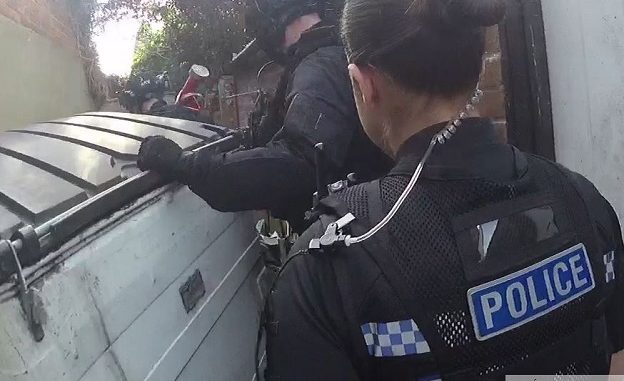
Twenty-eight people have been arrested and eight charged, including two in Thanet, as part of enforcement action to tackle the supply of drugs through county lines.
Officers also seized around 20 mobile phones suspected to contain evidence of criminal networks running from London into Kent. The action has helped reduce the number of active county lines in Kent from 82 in July, down to the current number of 67.
County Lines is where illegal drugs are transported from one area to another, often across police and local authority boundaries (although not exclusively), usually by children or vulnerable people who are coerced into it by gangs. The ‘County Line’ is the mobile phone line used to take the orders of drugs. Importing areas (areas where the drugs are taken to) are reporting increased levels of violence and weapons-related crimes as a result of this trend.
Between September 4-18 a series of search warrants were carried out during an operation to clamp down on those involved in the supply of heroin and crack cocaine. The period incorporated a coordinated week of intensification (from 14-18 September) which involved the National Crime Agency and other police forces, including the Metropolitan Police and British Transport Police.
Eight people have now been charged in connection with running separate county lines, including:
- On 12 September, officers searched a flat in Ethelbert Road, Margate where a phone suspected to contain evidence of the supply of Class A drugs was also recovered. Jesutomisin Ifeoluwa, aged 21, was charged with possession of criminal property, conspiracy to supply heroin and conspiracy to supply crack cocaine.
- Simultaneous search warrants were executed on 15 September at addresses in Ramsgate and Broadstairs, suspected to be linked to a county line. This led to the seizure of 227 wraps of heroin and crack cocaine as well as £850 in cash. Mateo Bondzie, aged 22, of Poplar Road, Broadstairs, was charged with being concerned in the supply of heroin and crack cocaine and with possessing criminal property (namely a proportion of the cash seized.)
Early morning warrants were also carried out at a number of locations in London, with assistance from the Metropolitan Police.
Detective Superintendent Mike Worrall said: “We have dedicated teams committed to tackling county lines and protecting those from being exploited. Part of our focus is to increasingly target those who we suspect to be ‘line holders’, which is why gathering phone evidence continues to be so crucial. These can be people who aren’t always necessary the dealers, but who may coordinate the distribution of drugs through the exploitation of children and vulnerable adults.
“The success of our approach lies with strong relationships and collaboration between other police forces and our partners, and this has led to a steady reduction in the number of active county lines in Kent from 82 in July, down to the current number of 67. This also has a positive knock-on effect in reducing incidents of serious violence including the use of weapons. We are determined to keep this number falling and the message remains very clear that anyone intent on dealing drugs can expect a robust response. Expect to be arrested and put before the courts.”
Across the country the week of action resulted in
- 1,041 arrests
- 1,551 vulnerable people engaged for safeguarding purposes
- 861 cuckooed addresses visited
- 102 devices being used to operate County Lines seized
- There were 69 referrals to the National Referral Mechanism (NRM), which assesses individuals as potential victims of human trafficking/modern slavery
- £526,000 in cash was seized
- Drugs worth more than £1 million were seized including £876,000 of cocaine, £87,000 of crack cocaine and £234,000 of heroin
- 196 weapons were seized including 130 knives, 18 firearms, 5 samurai swords, and 10 knuckledusters.
More than 3,600 people have now been arrested for being involved in County Lines since November 2019 when new tactics were established to target the supply of drugs through this method.
James Simmonds-Read, National Programme Manager at The Children’s Society’s Prevention programme, said: “Bringing down the criminals who cynically exploit vulnerable children through these county lines operations is crucial.
“But it’s equally important that the children they have groomed, who may have been deeply traumatised by horrific violence, threats, and sexual abuse, are recognised as victims.
“Too often, these young people do not get the support they need, or are seen as having chosen to get involved in crime when they were manipulated and coerced. It is vital these children are protected from abuse rather than prosecuted and professionals must also get better at identifying children who may be at risk of exploitation sooner and offering timely help.
“We want to see the Government define child criminal exploitation in law and adopt a new national strategy to tackle the issue. This strategy should focus upon ending the postcode lottery when it comes to identifying and supporting young people who are exploited, alongside efforts to disrupt the criminals who have groomed them.
“Spotting the signs that a child could be at risk isn’t just a matter for professionals. That’s why we launched our Look Closer campaign alongside the National Police Chiefs Council and British Transport Police during this week of action. We’re urging staff who work in the service sector including in hotels, shops and in public transport to spot the signs a child may be being exploited and to report concerns to the police.”

